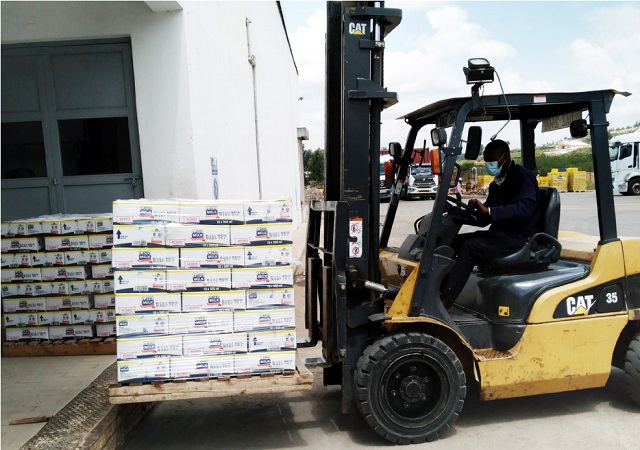
Kenya’s ban on milk imports from Uganda is to blame
Kampala, Uganda | JULIUS BUSINGE | Norman Nduho Kapaapa, a dairy farmer from Rwamuranda village, Kanyalyeru Sub-county, Kiruhura district loves President Yoweri Museveni’s message that urges Ugandans to engage in commercial agriculture to fight poverty.
“I would like to thank President Yoweri Museveni for teaching us about wealth creation through agriculture and for sending us veterinary workers to help us improve on farming practices,” Kapaapa told journalists at his farm on May 22.
But he is disappointed that fluctuating low milk prices are making it difficult to achieve wealth creation goals being preached by the President.
“I have put in a lot of effort in this farm but I’m getting less,” Kapaapa, who milks 10 cows, getting 50 litres of milk daily said. Kapaapa keeps 50 cows on his 50 acre piece of land.
He spends on average Shs1million to run the farm but only gets Shs750, 000 as income per month. That means he records a loss of Shs250, 000 monthly.
“We are asking government to help us find market for our milk,” he said. Currently, a litre of milk cost Shs600, down from the average of Shs800 recorded in the first four months of this year.
Similarly, George Buracweke, 70, from Rwozi village, Kanyalyeru Sub-county – Kiruhura district, said, “milk is not helping us as farmers.”
“You cannot plan when prices keep changing,” he said, adding that he gets 20 litres of milk from eight cows a day, earning Shs12, 000 a day or Shs360, 000 a month.
But he claims that he spends higher, an average of Shs600, 000 to run the farm monthly. Buracweke says, he would need to sell a litre of milk at Shs1, 000 (minimum) to break even.
Months before last year, farmers enjoyed high milk prices per litre of up to Shs1, 500 from milk processors like Pearl Dairy Farms Limited.
But processors like Pearl have cut on the quantities of milk purchased from farmers because of limited access to markets especially in East Africa.
At the beginning of 2020, Kenya banned dairy imports from Uganda citing complaints by Kenyan farmers over the influx of Ugandan milk which was being priced lower than the one produced in their home country.
The two governments have since been in talks to have the ban lifted, but nothing has come to fruition.
Buracweke is also calling upon government to help farmers improve on farm management practices especially now that the region is under quarantine because of the recent out-break of foot and mouth disease.
Enock Nuwagira, the general manager of a four-year-old Lake Mburo Farmers’ Cooperative Society, said, they have engaged government before on the issue of price but they are yet to get a tangible solution.
He says, his members largely survive on milk proceeds which is why government should further interest themselves in engaging Kenyan authorities to allow entry of Ugandan produced milk.
Glorias Ankunda, an agriculture extension worker hired by Pearl Dairy Farms Limited said, the latter has cut purchase of milk from farmers by around 55% since the Kenyan ban was instituted to 250, 000 liters from 800, 000 liters.
Ankunda said, farmers’ livelihoods have negatively been impacted by the drop in milk prices, and urges government to further engage Kenyan authorities to lift the ban.
“We have trained farmers on best farming practices and are able to now produce a lot of milk but the market is small,” Ankunda said.
Uganda produces 2.6billion litres of milk per annum. However, domestic demand stands at only 800 million litres, creating a huge surplus that foreign markets especially Kenya would consume.
Economic experts have hinted on protectionism as the main reason for Kenya restricting entry of Ugandan produced milk.
Kenya is EAC’s largest economy while Uganda comes third just behind Tanzania.
Protectionism tendencies, however ‘kill’ the whole purpose of the East African common market protocol, that allows, among other things, free movement of goods within member states.
If the milk price problem persists, farmers said, they will slowly substitute dairy farming – a traditional income generating activity for the region – for other activities including crop farming and beef fattening since a factory [for beef] is under construction in the region.
****
 The Independent Uganda: You get the Truth we Pay the Price
The Independent Uganda: You get the Truth we Pay the Price


